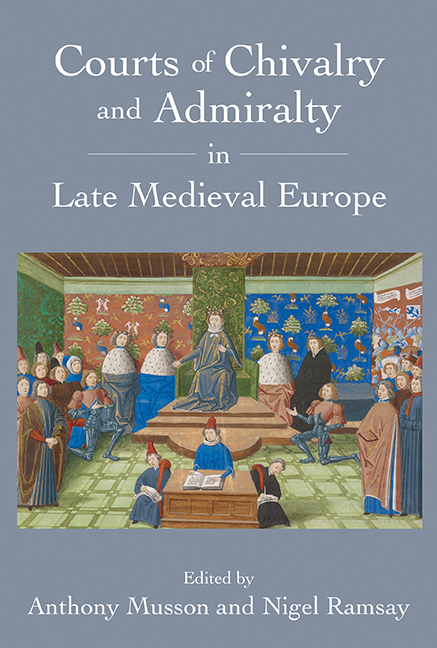Book contents
- Frontmatter
- Contents
- List of Illustrations
- Notes on Contributors
- Preface
- A Note on Editorial Practice
- List of Abbreviations
- Introduction
- Chapter 1 Heralds and the Court of Chivalry: From Collective Memory to Formal Institutions
- Chapter 2 French Armorial Disputes and Controls
- Chapter 3 Art, Objects and Ideas in the Records of the Medieval Court of Chivalry
- Chapter 4 Sir Robert Grosvenor and the Scrope–Grosvenor Controversy
- Chapter 5 From Brittany to the Black Sea: Nicholas Sabraham and English Military Experience in the Fourteenth Century
- Chapter 6 ‘Armed and redy to come to the felde’: Arming for the Judicial Duel in Fifteenth-Century England
- Chapter 7 The Jurisdiction of the Constable and Marshals of France in the Later Middle Ages
- Chapter 8 The Origins and Jurisdiction of the English Court of Admiralty in the Fourteenth Century
- Chapter 9 The Consulate of the Sea and its Fortunes in Late Medieval Mediterranean Countries
- Chapter 10 The Admiralty and Constableship of England in the Later Fifteenth Century: The Operation and Development of these Offices, 1462–85, under Richard, Duke of Gloucester and King of England
- Chapter 11 Some Dubious Beliefs about Medieval Prize Law
- index
Introduction
Published online by Cambridge University Press: 28 June 2018
- Frontmatter
- Contents
- List of Illustrations
- Notes on Contributors
- Preface
- A Note on Editorial Practice
- List of Abbreviations
- Introduction
- Chapter 1 Heralds and the Court of Chivalry: From Collective Memory to Formal Institutions
- Chapter 2 French Armorial Disputes and Controls
- Chapter 3 Art, Objects and Ideas in the Records of the Medieval Court of Chivalry
- Chapter 4 Sir Robert Grosvenor and the Scrope–Grosvenor Controversy
- Chapter 5 From Brittany to the Black Sea: Nicholas Sabraham and English Military Experience in the Fourteenth Century
- Chapter 6 ‘Armed and redy to come to the felde’: Arming for the Judicial Duel in Fifteenth-Century England
- Chapter 7 The Jurisdiction of the Constable and Marshals of France in the Later Middle Ages
- Chapter 8 The Origins and Jurisdiction of the English Court of Admiralty in the Fourteenth Century
- Chapter 9 The Consulate of the Sea and its Fortunes in Late Medieval Mediterranean Countries
- Chapter 10 The Admiralty and Constableship of England in the Later Fifteenth Century: The Operation and Development of these Offices, 1462–85, under Richard, Duke of Gloucester and King of England
- Chapter 11 Some Dubious Beliefs about Medieval Prize Law
- index
Summary
The wars waged by the English in France during the fourteenth and fifteenth centuries led to the need for judicial agencies that could deal with disputes that arose on land or sea, beyond the reach of indigenous laws. While much has been written on the culture of chivalry, to date the jurisdictional development of these Courts has attracted comparatively little scholarly attention. The court of the English Admiral in the medieval period has received significantly less. This volume explores the Courts of Chivalry and Admiralty, their officers and the wider cultural and political context in which they had jurisdiction and operated in later medieval Western Europe. Combining law with military and maritime history, and discussing the art and material culture of chivalric disputes as well as their associated heraldry, each chapter builds on recent work in the field and provides a valuable multidisciplinary outlook on an important area of medieval life and culture.
Established during Edward III's reign under the presidency of the Constable and Marshal of England, the Court of Chivalry heard cases that arose out of acts of war, including disputes over rights in prisoners and their ransoms as well as about rights to particular coats of arms. It also took cognisance of appeals of treason, in which battle was offered by the appellant. Around the same period, the Court of the Admiralty, under the titular presidency of the Admiral of England, claimed jurisdiction over the waters surrounding the English king's territories and heard cases under maritime law involving a broad remit of issues, including naval discipline and administration, coastal defence, threats to shipping, disputes over prizes, wrecks and the depredations of pirates. Both courts were distinct from the other central courts in employing the civil law procedures of the Continental ius commune system rather than the English common law.
The developing European cult of chivalry gave greater prominence to the Prince's position as head of an apparatus that would resolve disputes between members of the noble and knightly ranks, particularly over coats of arms, as well as over military discipline and military and maritime perquisites such as ransoms and prizes.
- Type
- Chapter
- Information
- Publisher: Boydell & BrewerPrint publication year: 2018



